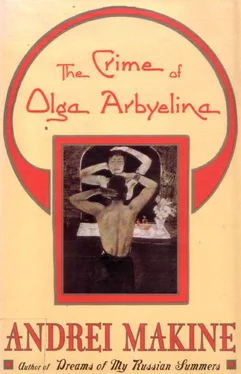He half stood up and, shaken by the instability of the boat, lurched headlong toward the stern where she was sitting. She moved aside so as not to be crushed by this unbalanced mass, braying with laughter. He reached her all the same, hung over her, and tugged roughly at her dress.
At this moment she saw a twisted, rusty steel structure rising up out of the water and growing rapidly larger. It seemed to her that the boat overturned almost gently…
She would never know if the violence with which Golets hurled himself at her and clung to her body was due to his drunkenness, his desire to save her, or his inability to swim. Perhaps he, in his turn, was trying to push away the woman who threatened to drown him. Or was it already the death throes? Nor would she ever know whether he had been wounded at the very moment when he fell or afterward, when he sank and resurfaced, already lifeless.
Whatever the reason for his brutality, by a macabre coincidence, Golets s gestures parodied the carnal act of which he had dreamed. He clasped the body he desired, did violence to it, tore off the upper part of her clothes, laying bare her shoulders and her breasts, lacerating the skin with his nails.
This savage struggle lasted scarcely a few seconds. He disappeared beneath the water and surfaced a little farther off, closer to the bank, at a spot sheltered from the force of the current. His body came to rest between a block of concrete, a narrow spit of sand, and the stems of reeds on which green and blue dragonflies continued to settle.
She swam, or rather allowed herself to be carried, surrounded by the tatters of her dress, as far as this sheltered spot. Just a few yards from the place of their shipwreck her foot touched the bottom. It all seemed like a game. And yet a few feet away from her floated this fully dressed body and the water around his head was turning brown.
On the bank two men could be seen running along, led by a boy who still had his fishing rod in his hand.
It seemed to her as if she remained for weeks on that sunny river-bank, on the ancient tree stump where the first witnesses had found her sitting. There were no nights anymore, nothing but that interminable day, the muggy effluvia arising from the water, the smell of the plants and the mud; and the hot, slightly hazy light, more dazzling to the eye than glaring sunlight.
Interminably, people came and went, surrounded her; dispersed; timidly approached the corpse of the drowned man; made their comments. She recognized almost all of them: the Russified pharmacist, the director of the retirement home, the old swordsman, the nurse, the woman from the station ticket office… She noticed that they all of them, even in these exceptional circumstances, remained true to their roles, to their masks. The nurse, with her bitter expression, did not fail to let it be understood that the mourning she wore was a good deal more worthy of respect than this stupid accident. The ticket office woman was constantly consulting her watch. The director managed the tragedy. The pharmacist moved from one group to another, happily taking part in discussions both in French and Russian without distinction. And beside the willow trees, mingling with the buzz of conversations, there rang out the merry "s-s-shlim!"…
She felt herself to be the focus of dozens of inquiring-or quite simply curious-looks. These excited spectators were attempting, as they might have done in adjusting binoculars, to bring together into a single focus the Princess Arbyelina and this woman clad in water-soaked rags, a woman who made no effort to cover up her breast that was streaked with scratches. Some of them, those who felt they knew her better, addressed her in hushed voices-as if sounding out the silence of a bedroom to see if the person in there is asleep… She remained motionless, seemed blind, inaccessible to words. Yet her eyes were alive, noting the new faces in the parade of gawkers, observing that the smear of clay on the man's forehead had disappeared, washed away, no doubt, at the moment of drowning…
But what could she say to those who, like the director, leaned toward her and murmured questions that were unbelievable in their human triviality, supposedly intended to bring her out of her state of shock? Shock… shock… shock, the voices kept repeating in all the little groups. She should have told them about that smear of clay, about the impossibility of wiping it away that she had experienced in the boat, yes, her inability to wet her fingers, to touch that brow. Told them, too, about that unique fragment of beauty that had, by chance, sprung from that hopelessly ugly man-the phrase he had uttered a quarter of an hour before his death: "And to think that these water meadows were all covered in snow…" But would they have understood? Perhaps only the old lady from the retirement home who suddenly went up to the corpse and removed a long strand of waterweed from its face. Whispered reproaches arose on all sides-nothing must move.
And nothing moved. The humid, stifling afternoon went on forever. The police arrived, the crowd regrouped itself. The days passed, but there were no nights. Always the same sun, the same lukewarm river, the same people, the corpse. The clothes it was dressed in gradually dried. And the scratches on the woman's breast ("On my breast," she said, but while recognizing herself less and less) closed up, faded…
The investigating magistrate questioned her in his office-and yet she was still that woman sitting on the riverbank where nothing had changed: the drowned man, the gawkers, and, from now on, this magistrate bending over the corpse, feeling the sides of the boat, going from one spectator to another and then stopping face to face with the half-undressed woman. He called this woman "Madame Arbélina"; she became it and, at least initially, even felt relieved to be it. It was thus easier for her to admit that she had detested Golets, that the idea of killing him had often occurred to her. And that she had in fact killed him, even killed him twice over, for first of all she had not wiped his mud-spotted forehead (and that gesture could have changed everything!); and later on, when he did not know what to do with the empty bottle and the moment of his death was approaching, she had remained absolutely passive, an accomplice as the minutes fatally drained away.
One day she felt she could finally relate the essence of the case to this man who listened to her with such interest. Visibly the investigating magistrate was beginning to realize that he had in front of him not a certain "Madame Arbélina" but a woman who carried within her strange winter nights and terrible fissures that an ordinary object, an innocent word, could cause to erupt at any given moment. Encouraged by his understanding, she talked about the inexpressible beauty of the winter she had just lived through; about the tiny pond with the trapped fish; about the branch forever letting its hoarfrost crystals fall… She lived again through those moments of silence and marveled to discover that her listener, too, went along with it more each day She was certain now that she could confide her secret to him…
So why did the stammerer suddenly appear, claiming to be Golets's best friend? Was she confronted by him, or did she learn of his existence thanks to the more and more numerous theories about the crime that had the Caravanserai, and indeed the whole town, in turmoil? She no longer remembered. In any event this Loo-loo's evidence turned everything upside down. Struggling painfully against his diction he testified: Golets knew that before the war Prince Ar-byelin had engaged in a dubious traffic in properties in Russia owned by émigrés and so… The magistrate considered this new theory to be fanciful. Golets scarcely knew the prince and would never have been able to prove in what way these sales were illicit…
Читать дальше












